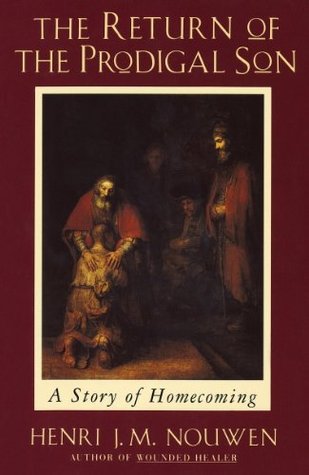More on this book
Community
Kindle Notes & Highlights
For years I had instructed students on the different aspects of the spiritual life, trying to help them see the importance of living it. But had I, myself, really ever dared to step into the center, kneel down, and let myself be held by a forgiving God?
Each little step toward the center seemed like an impossible demand, a demand requiring me to let go one more time from wanting to be in control, to give up one more time the desire to predict life, to die one more time to the fear of not knowing where it all will lead, and to surrender one more time to a love that knows no limits.
And still, I knew that I would never be able to live the great commandment to love without allowing myself to be loved without conditions or prerequisites.
Kenneth Bailey, in his penetrating explanation of Luke’s story, shows that the son’s manner of leaving is tantamount to wishing his father dead.
The request means—he wants his father to die. Bailey explains that the son asks not only for the division of the inheritance, but also for the right to dispose of his part.
The son’s “leaving” is, therefore, a much more offensive act than it seems at first reading.
More than disrespect, it is a betrayal of the treasured values of family and community. The “distant country” is the world in which everything considered holy at home is disregarded.
Leaving home is, then, much more than an historical event bound to time and place. It is a denial of the spiritual reality that I belong to God with every part of my being, that God holds me safe in an eternal embrace, that I am indeed carved in the palms of God’s hands and hidden in their shadows.
It is the never-interrupted voice of love speaking from eternity and giving life and love whenever it is heard. When I hear that voice, I know that I am home with God and have nothing to fear.
As the Beloved, I can confront, console, admonish, and encourage without fear of rejection or need for affirmation.
I leave home every time I lose faith in the voice that calls me the Beloved and follow the voices that offer a great variety of ways to win the love I so much desire.
am the prodigal son every time I search for unconditional love where it cannot be found. Why do I keep ignoring the place of true love and persist in looking for it elsewhere?
He had to let him go in freedom, even though he knew the pain it would cause both his son and himself. It was love itself that prevented him from keeping his son home at all cost.
Of one thing I am sure. Complaining is self-perpetuating and counterproductive. Whenever I express my complaints in the hope of evoking pity and receiving the satisfaction I so much desire, the result is always the opposite of what I tried to get.
The Father’s love does not force itself on the beloved. Although he wants to heal us of all our inner darkness, we are still free to make our own choice to stay in the darkness or to step into the light of God’s love. God is there. God’s light is there. God’s forgiveness is there. God’s boundless love is there. What is so clear is that God is always there, always ready to give and forgive, absolutely independent of our response.
As I look back on this spiritual event, I see it as a true return, the return from a false dependence on a human father who cannot give me all I need to a true dependence on the divine Father who says: “You are with me always, and all I have is yours”; the return also from my complaining, comparing, resentful self to my true self that is free to give and receive love.
allows me to let my dad be no less than the good, loving, but limited human being he is, and to let my heavenly Father be the God whose unlimited, unconditional love melts away all resentments and anger and makes me free to love beyond the need to please or find approval.
The discipline of gratitude is the explicit effort to acknowledge that all I am and have is given to me as a gift of love, a gift to be celebrated with joy.
Gratitude as a discipline involves a conscious choice. I can choose to be grateful even when my emotions and feelings are still steeped in hurt and resentment.
There is an Estonian proverb that says: “Who does not thank for little will not thank for much.”
The leap of faith always means loving without expecting to be loved in return, giving without wanting to receive, inviting without hoping to be invited, holding without asking to be held.


